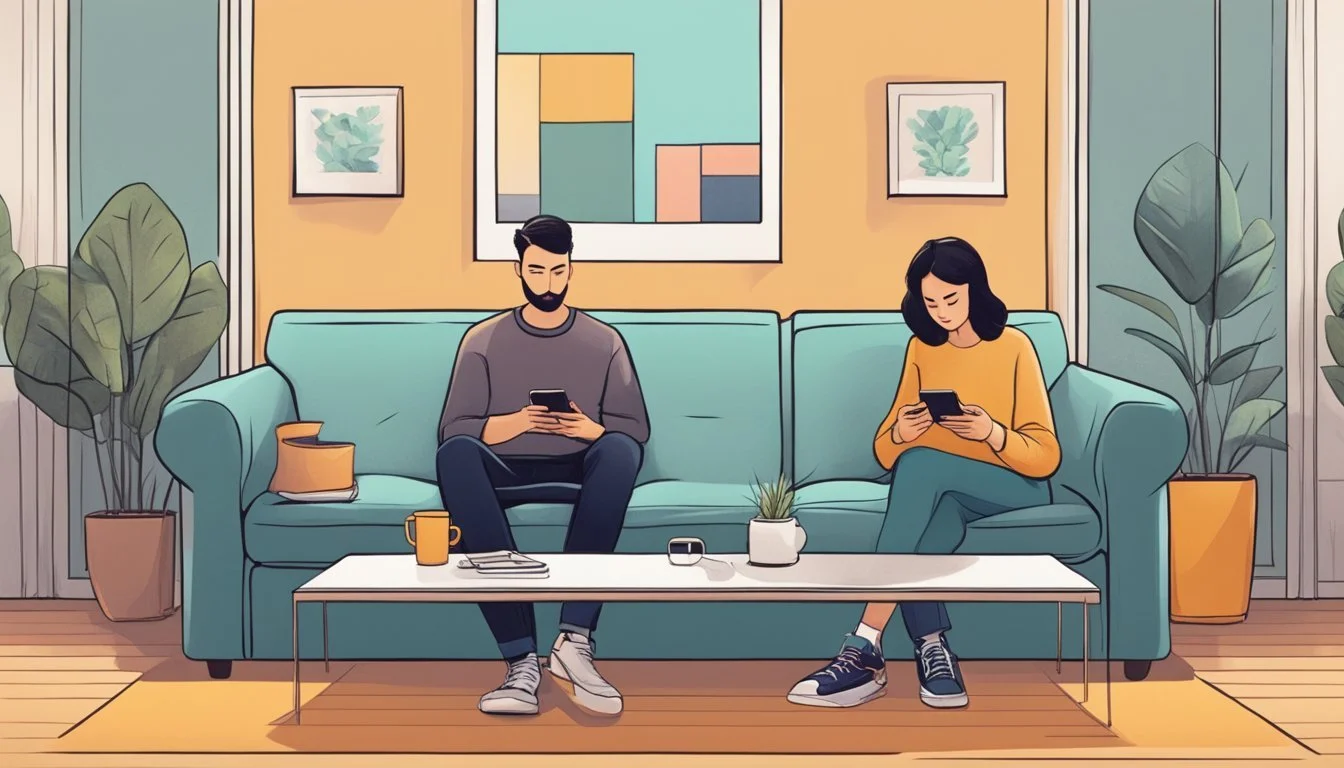11 Signs You May Be Emotionally Neglecting Your Partner
What to Watch For
Emotional neglect in a relationship is a subtle issue that can significantly affect the bond between partners. It often manifests in behaviors that may seem innocuous at first but compound over time, leading to feelings of isolation and dissatisfaction. Understanding these signs can help partners address and rectify issues, fostering a healthier emotional connection.
Many individuals might not even realize they are neglecting their partner emotionally. By identifying and acknowledging these behaviors, partners can take proactive steps to communicate better and support each other more effectively. Highlighting the importance of mutual emotional care can enhance the overall well-being of the relationship.
1) Frequent Disinterest in Partner’s Feelings
A common sign of emotional neglect is when one partner consistently shows disinterest in the other’s feelings.
When a partner regularly fails to ask about their significant other's day or emotions, it signals a lack of emotional investment.
Ignoring or dismissing issues important to the partner can erode the emotional foundation of the relationship.
This disinterest can result in the emotionally neglected partner feeling isolated and unsupported.
For example, if one partner is visibly upset and the other continues with their activities without offering support or concern, this indicates emotional neglect.
Repeatedly brushing off discussions about feelings or changing the subject can also exemplify this neglect. Such behavior communicates to the partner that their emotional state is not valued.
Ultimately, consistent indifference can lead to a breakdown of emotional intimacy within the relationship.
Open communication and active listening are crucial for maintaining a strong emotional connection. For more insights, visit Bustle's article on habits in relationships.
2) Avoiding Deep Conversations
A partner avoiding deep conversations may be a sign of emotional neglect. Genuine engagement in meaningful dialogue is essential for relationship growth. When one partner consistently steers clear of discussing important topics, it can create a disconnect.
This avoidance can stem from various reasons, such as discomfort with vulnerability or a fear of conflict. It often leaves the other partner feeling isolated and unheard. Healthy relationships rely on open and honest communication to address issues and share feelings.
Additionally, avoiding deep conversations can prevent the resolution of underlying problems. Over time, unaddressed issues may build up, leading to greater tension. Both partners need to feel safe expressing themselves.
Relationships thrive when both individuals are willing to discuss their thoughts, dreams, and concerns. If a partner continually evades these conversations, it's important to address this behavior. Encouragement and patience can help create a more open and supportive environment.
Creating this environment requires effort from both parties. It's crucial to foster trust and demonstrate that sharing feelings is safe and valued. This helps in establishing a more emotionally connected relationship.
For more details on the significance of deep conversations, consider reading further on how avoiding deep discussions is a key indicator that a partner may not be emotionally invested.
3) Limited Physical Affection
Limited physical affection can be a significant indication of emotional neglect in a relationship. Physical touch is a basic way humans express love and connection. When it is consistently lacking, a partner may feel distant or unloved.
Physical affection includes actions like hugging, holding hands, and kissing. These gestures often help partners feel more secure and connected. The absence of such gestures can create emotional barriers.
Partners who limit physical affection might not realize the negative impact it has. They might be busy, stressed, or simply unaware of their partner's needs. Addressing this issue directly can help bring awareness and encourage more frequent affection.
Couples should communicate openly about their needs and expectations regarding physical touch. Understanding each other’s preferences can help bridge the gap and foster a closer bond.
4) Prioritizing Screen Time Over Quality Time
In today's digital age, screens are omnipresent. Yet, placing more importance on screen time than on real, quality interaction can distance partners.
When one partner frequently opts for their device over engaging in face-to-face conversation, it signals emotional neglect. This habit can make the other partner feel undervalued and ignored.
Effective communication hinges on presence and attention. Choosing screens over these moments erodes relationship bonds. Emotional intimacy relies on genuine, undistracted connection, which is compromised by persistent screen use.
While digital devices serve many purposes, balancing their role in daily life is crucial. Couples should set aside specific time for each other, device-free, to truly connect and nurture their relationship.
5) Lack of Positive Reinforcement
Positive reinforcement plays a crucial role in maintaining a healthy relationship. When a partner consistently fails to acknowledge or celebrate achievements, it can leave the other feeling unappreciated. This lack of support creates a gap in emotional connection and may lead to feelings of resentment.
Partners need to show encouragement when milestones are reached. This recognition doesn't have to be elaborate; sometimes, simple words or gestures are enough. Without positive feedback, one might start to question their value in the relationship.
Not receiving positive reinforcement can significantly affect one's self-esteem. In supportive relationships, partners motivate each other to grow and succeed. Missing this element can make the relationship feel more like a burden rather than a supportive partnership.
Feeling undervalued when efforts go unnoticed can erode the emotional foundation of a relationship. It's essential to regularly express appreciation and support, even for small accomplishments. This fosters a nurturing environment and ensures both partners feel seen and valued.
Emotional neglect often includes the absence of positive reinforcement, leading to a sense of isolation. When achievements aren't acknowledged, it signals a lack of interest and engagement in the relationship. Recognition and encouragement are fundamental to maintaining emotional bonds.
For more on the impact of a lack of positive reinforcement in relationships, check out this detailed insight.
6) Infrequent Expressions of Gratitude
A clear indicator of emotional neglect in a relationship is the lack of regular expressions of gratitude. When a partner stops acknowledging the small and big things their other half does, it creates a feeling of being taken for granted.
Simple gestures like saying "thank you" can strengthen a bond. Without these, resentment can build. The absence of gratitude undermines the emotional connection, signaling a deeper issue within the relationship.
For example, couples thriving on mutual appreciation tend to feel more connected. Without frequent expressions of gratitude, one partner may start to feel unnoticed and undervalued. This feeling can lead to emotional distance.
Frequent acknowledgments don't have to be grand gestures. Even small, consistent remarks expressing thanks can make a significant difference. Recognizing this gap can help both partners work toward better communication and appreciation. Addressing it openly can foster a healthier and more satisfying relationship for both.
7) Rarely Addressing Partner’s Concerns
When one consistently fails to address their partner’s concerns, it can lead to feelings of neglect. Partners need to feel heard and understood. Ignoring these concerns signals a lack of interest and empathy, causing emotional disconnection.
Conversation is key in any relationship. A partner who dismisses or avoids addressing issues can make the other feel unimportant. This neglect can erode trust over time.
Addressing concerns also shows respect. When one doesn't take the time to respond or engage with their partner’s worries, it can create a sense of isolation. Open communication helps bridge any emotional gaps that may form.
Clicking through to signs of emotional neglect adds valuable insights into recognizing and correcting these patterns. Responsive dialogue fosters mutual respect and strengthens the emotional bond in the relationship.
8) Minimal Shared Activities
When partners engage in minimal shared activities, it can be a sign of emotional neglect. Shared activities, such as hobbies, sports, or even simple routines like watching a favorite show together, foster bonding and connection.
If one partner consistently avoids these activities, it might indicate a lack of interest in maintaining the emotional health of the relationship.
Participating in shared activities helps build a sense of partnership and mutual enjoyment. It allows both individuals to invest time and energy into the relationship, creating memories and strengthening their bond.
Lack of participation can leave one partner feeling isolated and unsupported.
A relationship thrives on mutual engagement and shared experiences. When these activities are missing, it can lead to feelings of disconnection. The partner feeling neglected might perceive this as a lack of effort in making the relationship work.
Regularly finding time for shared interests can prevent emotional distance from growing.
Couples should strive to integrate more activities that both enjoy. This effort requires communication and willingness from both sides. For example, planning a weekly date night or taking up a new hobby together can be effective ways to nurture the relationship.
Even small, consistent activities can significantly improve the emotional connection between partners.
9) Neglecting Emotional Check-Ins
Routine emotional check-ins are a critical part of maintaining a healthy relationship. They ensure both partners feel heard and valued. When these check-ins are neglected, one partner may feel ignored or undervalued, leading to emotional distance.
Neglecting to ask about your partner's day, feelings, or concerns can signal emotional neglect. This lack of interest can make them feel unimportant. Regular discussions help build emotional intimacy and trust.
Partners may also miss out on essential emotional cues without these check-ins. By not engaging in regular emotional conversations, partners might fail to recognize each other’s emotional needs. This can further exacerbate feelings of neglect and isolation.
A simple question like "How are you feeling today?" can make a significant difference. It shows that you care and are invested in their emotional well-being. Neglecting this can create a significant emotional gap in the relationship. Regular emotional check-ins are a small effort with a big impact on the overall health of the relationship. Missing out on these crucial moments can lead to misunderstandings and emotional withdrawal. They help in identifying and addressing potential issues early on.
10) Tendency to Criticize More Than Praise
A common sign of emotional neglect in a relationship is when one partner frequently criticizes the other more than they offer praise. This behavior can stem from various reasons.
They might have concerns about their partner's motivation, skill level, or performance. In some cases, they may feel that their partner is not contributing enough or being a team player.
Criticism often lasts longer in our memories than praise. Our brains are wired to remember negative comments more vividly because they evoke stronger emotional responses. This can lead to a lasting impact on the partner being criticized.
Constant criticism can erode trust and create a communication breakdown. When feedback is always negative, it can make the other person defensive and unwilling to listen. This hindrance in effective communication can strain the relationship.
Emotional neglect through constant criticism can diminish the partner's self-esteem. It often makes them feel undervalued and unappreciated. Balancing criticism with genuine praise can help in maintaining a healthier dynamic.
For anyone experiencing this, it is essential to address these patterns. Open discussions and a focus on positive reinforcement can lead to a more supportive environment in the relationship.
11) Failure to Apologize After Disagreements
Failing to apologize after disagreements can undermine the trust and harmony in a relationship. When one partner refuses to admit fault, it leaves the other feeling invalidated and unimportant. This behavior disrupts emotional balance and can lead to persistent resentment.
A partner who never apologizes might constantly play the victim, blaming circumstances or others instead. This refusal to take responsibility creates a recurring cycle of unresolved conflict. It can make the wronged partner feel unheard and disregarded.
Recognizing this pattern is crucial for the health of the relationship. Apologizing demonstrates empathy and a willingness to repair the bond. Without this, emotional distance can grow. Admitting mistakes fosters understanding and strengthens partnership dynamics.
For more insights, the Expert Editor highlights how always playing the victim and never learning from mistakes are significant red flags. Accepting fault is not just about the act itself but about showing commitment to the relationship.
By acknowledging their role in conflicts, partners can work towards healthier communication and mutual respect. Ignoring this necessity can have lasting impacts, making recovery from disagreements much harder and more damaging.
The Importance of Emotional Connection
Emotional connection is vital for fostering intimacy and ensuring long-term relationship satisfaction. Its absence can lead to feelings of isolation and disconnection.
Understanding Emotional Connection
Emotional connection involves shared feelings of empathy, trust, and understanding between partners. It means being attuned to each other’s emotional needs and experiences. This connection is strengthened by open communication and mutual support.
Acts such as sharing moments of joy, expressing concerns, and comforting each other in difficult times help build emotional bonds. When partners actively work to understand and support each other’s emotional worlds, it creates a sense of unity and partnership.
Consequences of Emotional Neglect
Emotional neglect occurs when one partner consistently ignores or dismisses the other’s emotional needs. This can lead to a breakdown in communication and emotional intimacy.
Feelings of loneliness and resentment may arise, as one or both partners feel unsupported and undervalued. Persistent neglect can damage trust and increase the risk of relationship dissolution.
Addressing emotional neglect by recognizing and attending to each other's emotional needs is crucial for maintaining a healthy, fulfilling relationship.
Effective Communication Strategies
Effective communication involves both listening attentively and expressing feelings in a clear, respectful manner. By focusing on these aspects, partners can better understand each other's needs and prevent emotional neglect.
Active Listening
Active listening requires giving full attention to the speaker and avoiding distractions. It is important for the listener to make eye contact, nod in agreement, and offer verbal affirmations like "I understand."
Reflective listening can also help. This technique involves paraphrasing what the other person has said to confirm understanding. For example, "It sounds like you're saying you feel ignored when I don't acknowledge your efforts."
To enhance active listening, avoiding interruptions is crucial. Allow the speaker to complete their thoughts before responding. This demonstrates respect and shows a genuine interest in their feelings and perspective. Additionally, providing feedback and asking open-ended questions can further the conversation and deepen the emotional connection.
Expressing Feelings Clearly
Clear expression of feelings involves using "I" statements rather than "you" statements to avoid sounding accusatory. For example, instead of saying, "You never listen to me," one might say, "I feel unheard when my concerns are not acknowledged."
Being specific about emotions and the situations that trigger them is vital. Vague statements can lead to misunderstandings, so clarity is key. For instance, rather than saying, "I'm upset," a more effective approach would be, "I'm upset because I feel my efforts are not being recognized."
Timing also plays a role. Choosing a calm moment to express feelings, rather than during an argument, can lead to more productive conversations. Finally, maintaining a respectful and non-confrontational tone helps in conveying feelings without escalating tensions.








